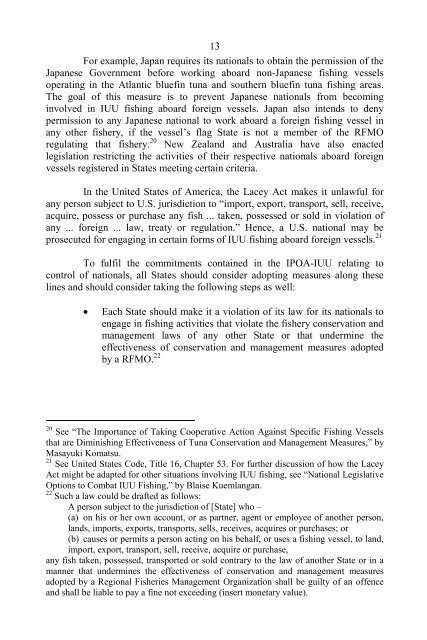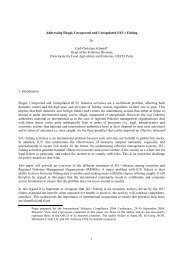Implementation of IPOA/IUU - International MCS Network
Implementation of IPOA/IUU - International MCS Network
Implementation of IPOA/IUU - International MCS Network
You also want an ePaper? Increase the reach of your titles
YUMPU automatically turns print PDFs into web optimized ePapers that Google loves.
13For example, Japan requires its nationals to obtain the permission <strong>of</strong> theJapanese Government before working aboard non-Japanese fishing vesselsoperating in the Atlantic bluefin tuna and southern bluefin tuna fishing areas.The goal <strong>of</strong> this measure is to prevent Japanese nationals from becominginvolved in <strong>IUU</strong> fishing aboard foreign vessels. Japan also intends to denypermission to any Japanese national to work aboard a foreign fishing vessel inany other fishery, if the vessel’s flag State is not a member <strong>of</strong> the RFMOregulating that fishery. 20 New Zealand and Australia have also enactedlegislation restricting the activities <strong>of</strong> their respective nationals aboard foreignvessels registered in States meeting certain criteria.In the United States <strong>of</strong> America, the Lacey Act makes it unlawful forany person subject to U.S. jurisdiction to “import, export, transport, sell, receive,acquire, possess or purchase any fish ... taken, possessed or sold in violation <strong>of</strong>any ... foreign ... law, treaty or regulation.” Hence, a U.S. national may beprosecuted for engaging in certain forms <strong>of</strong> <strong>IUU</strong> fishing aboard foreign vessels. 21To fulfil the commitments contained in the <strong>IPOA</strong>-<strong>IUU</strong> relating tocontrol <strong>of</strong> nationals, all States should consider adopting measures along theselines and should consider taking the following steps as well:Each State should make it a violation <strong>of</strong> its law for its nationals toengage in fishing activities that violate the fishery conservation andmanagement laws <strong>of</strong> any other State or that undermine theeffectiveness <strong>of</strong> conservation and management measures adoptedby a RFMO. 2220 See “The Importance <strong>of</strong> Taking Cooperative Action Against Specific Fishing Vesselsthat are Diminishing Effectiveness <strong>of</strong> Tuna Conservation and Management Measures,” byMasayuki Komatsu.21 See United States Code, Title 16, Chapter 53. For further discussion <strong>of</strong> how the LaceyAct might be adapted for other situations involving <strong>IUU</strong> fishing, see “National LegislativeOptions to Combat <strong>IUU</strong> Fishing,” by Blaise Kuemlangan.22 Such a law could be drafted as follows:A person subject to the jurisdiction <strong>of</strong> [State] who –(a) on his or her own account, or as partner, agent or employee <strong>of</strong> another person,lands, imports, exports, transports, sells, receives, acquires or purchases; or(b) causes or permits a person acting on his behalf, or uses a fishing vessel, to land,import, export, transport, sell, receive, acquire or purchase,any fish taken, possessed, transported or sold contrary to the law <strong>of</strong> another State or in amanner that undermines the effectiveness <strong>of</strong> conservation and management measuresadopted by a Regional Fisheries Management Organization shall be guilty <strong>of</strong> an <strong>of</strong>fenceand shall be liable to pay a fine not exceeding (insert monetary value).
















